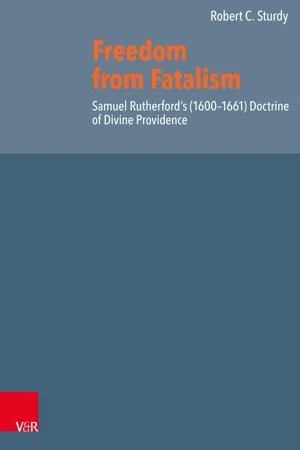
Freedom from Fatalism
Samuel Rutherford's (1600–1661) Doctrine of Divine Providence
- 357 pages
- English
- PDF
- Available on iOS & Android
About this book
Samuel Rutherford's (1600-1661) scholastic theology has been criticized as overly deterministic and even fatalistic, a charge common to Reformed Orthodox theologians of the era. This project applies the new scholarship on Reformed Orthodoxy to Rutherford's doctrine of divine providence. The doctrine of divine providence touches upon many of the disputed points in the older scholarship, including the relationship between divine sovereignty and creaturely freedom, necessity and contingency, predetermination, and the problem of evil. Through a close examination of Rutherford's Latin works of scholastic theology, as well as many of his English works, a portrait emerges of the absolutely free and independent Creator, who does not utilize his sovereignty to dominate his subordinate creatures, but rather to guarantee their freedom. This analysis challenges the older scholarship while making useful contributions to the lively conversation concerning Reformed thought on freedom.
Frequently asked questions
- Essential is ideal for learners and professionals who enjoy exploring a wide range of subjects. Access the Essential Library with 800,000+ trusted titles and best-sellers across business, personal growth, and the humanities. Includes unlimited reading time and Standard Read Aloud voice.
- Complete: Perfect for advanced learners and researchers needing full, unrestricted access. Unlock 1.4M+ books across hundreds of subjects, including academic and specialized titles. The Complete Plan also includes advanced features like Premium Read Aloud and Research Assistant.
Please note we cannot support devices running on iOS 13 and Android 7 or earlier. Learn more about using the app.
Information
Table of contents
- Title Page
- Copyright
- Abstract
- Table of Contents
- Figures
- Preface
- Introduction
- 1. Samuel Rutherford: An Introduction to His Life, Education, Major Controversies, and Writings
- 2. The Doctrine of God’s Being
- 3. God’s Knowledge
- 4. God’s Will
- 5. God’s Power
- 6. Creation and God’s Providence
- 7. Providence, Concursus, and Human Freedom
- Conclusions
- Bibliography
- Index of Names
- Index of Subjects
- Body